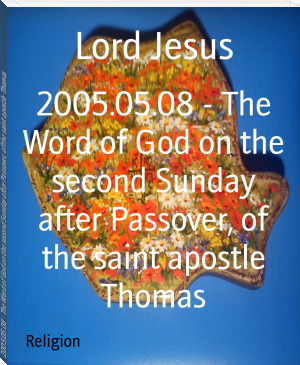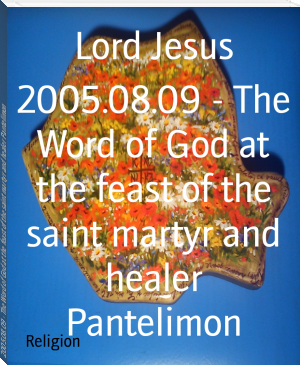The Story of a Soul - Saint Thérèse de Lisieux (best color ereader .TXT) 📗

- Author: Saint Thérèse de Lisieux
- Performer: -
Book online «The Story of a Soul - Saint Thérèse de Lisieux (best color ereader .TXT) 📗». Author Saint Thérèse de Lisieux
Now that he was with God, the last ties which kept his consoling Angel in the world were broken. Angels do not remain on this earth; when they have accomplished their mission, they return instantly to Heaven. That is why they have wings. Céline tried therefore to fly to the Carmel; but the obstacles seemed insurmountable. One day, when matters were going from bad to worse, I said to Our Lord after Holy Communion: "Thou knowest, dear Jesus, how earnestly I have desired that the trials my Father endured should serve as his purgatory. I long to know if my wish is granted. I do not ask Thee to speak to me, I only want a sign. Thou knowest how much opposed is Sister N. to Céline's entering; if she withdraw her opposition, I shall regard it as an answer from Thee, and in this way I shall know that my Father went straight to Heaven."
God, Who holds in His Hand the hearts of His creatures, and inclines them as He will, deigned in His infinite mercy and ineffable condescension to change that Sister's mind. She was the first person I met after my thanksgiving, and, with tears in her eyes, she spoke of Céline's entrance, which she now ardently desired. Shortly afterwards the Bishop set every obstacle aside, and then you were able, dear Mother, without any hesitation, to open our doors to the poor little exile.[6]
Now I have no desire left, unless it be to love Jesus even unto folly! It is Love alone that draws me. I no longer wish either for suffering or death, yet both are precious to me. Long did I call upon them as the messengers of joy. I have suffered much, and I have thought my barque near indeed to the Everlasting Shore. From earliest childhood I have imagined that the Little Flower would be gathered in its springtime; now, the spirit of self-abandonment alone is my guide. I have no other compass, and know not how to ask anything with eagerness, save the perfect accomplishment of God's designs upon my soul. I can say these words of the Canticle of our Father, St. John of the Cross:
"I drank deep in the cellar of my Friend, And, coming forth again,
Knew naught of all this plain, And lost the flock I erst was wont
to tend. My soul and all its wealth I gave to be His Own; No more
I tend my flock, all other work is done, And all my exercise is
Love alone."[7]
Or rather:
"Love hath so wrought in me Since I have known its sway, That all within me, whether good or ill, It makes subservient to the end it seeks, And soon transforms my soul into itself."[8]
Full sweet is the way of Love. It is true one may fall and be unfaithful to grace; but Love, knowing how to profit by everything, quickly consumes whatever is displeasing to Jesus, leaving in the heart only a deep and humble peace. I have obtained many spiritual lights through the works of St. John of the Cross. When I was seventeen and eighteen they were my only food; but, later on, and even now, all spiritual authors leave me cold and dry. However beautiful and touching a book may be, my heart does not respond, and I read without understanding, or, if I understand, I cannot meditate. In my helplessness the Holy Scriptures and the Imitation are of the greatest assistance; in them I find a hidden manna, genuine and pure. But it is from the Gospels that I find most help in the time of prayer; from them I draw all that I need for my poor soul. I am always discovering in them new lights and hidden mysterious meanings. I know and I have experienced that "the Kingdom of God is within us."[9] Our Lord has no need of books or teachers to instruct our souls. He, the Teacher of Teachers, instructs us without any noise of words. I have never heard Him speak, yet I know He is within me. He is there, always guiding and inspiring me; and just when I need them, lights, hitherto unseen, break in. This is not as a rule during my prayers, but in the midst of my daily duties. Sometimes, however, as this evening, at the close of a meditation spent in utter dryness, a word of comfort is given to me: "Here is the Master I give thee, He will teach thee all that thou shouldst do. I wish thee to read in the Book of Life in which is contained the science of love. . . ."[10]
The Science of Love! How sweetly do these words echo in my soul! That science alone do I desire. Having given all my substance for it, like the Spouse in the Canticles, "I think that I have given nothing."[11] After so many graces, may I not sing with the Psalmist that "the Lord is good, that His Mercy endureth for ever"?[12]
It seems to me that if everyone were to receive such favours God would be feared by none, but loved to excess; that no one would ever commit the least wilful fault—and this through love, not fear.
Yet all souls cannot be alike. It is necessary that they should differ from one another in order that each Divine Perfection may receive its special honour. To me, He has given His Infinite Mercy, and it is in this ineffable mirror that I contemplate his other attributes. Therein all appear to me radiant with Love. His Justice, even more perhaps than the rest, seems to me to be clothed with Love. What joy to think that Our Lord is just, that is to say, that He takes our weakness into account, that He knows perfectly the frailty of our nature! Of what, then, need I be afraid?
Will not the God of Infinite Justice, Who deigns so lovingly to pardon the sins of the Prodigal Son, be also just to me "who am always with Him"?[13]
In the year 1895 I received the grace to understand, more than ever, how much Jesus desires to be loved. Thinking one day of those who offer themselves as victims to the Justice of God, in order to turn aside the punishment reserved for sinners by taking it upon themselves, I felt this offering to be noble and generous, but was very far from feeling myself drawn to make it. "O my Divine Master," I cried from the bottom of my heart, "shall Thy Justice alone receive victims of holocaust? Has not Thy Merciful Love also need thereof? On all sides it is ignored, rejected . . . the hearts on which Thou wouldst lavish it turn to creatures, there to seek their happiness in the miserable satisfaction of a moment, instead of casting themselves into Thine Arms, into the unfathomable furnace of Thine Infinite Love.
"O my God! must Thy Love which is disdained lie hidden in Thy Heart? Methinks, if Thou shouldst find souls offering themselves as victims of holocaust to Thy Love, Thou wouldst consume them rapidly; Thou wouldst be well pleased to suffer the flames of infinite tenderness to escape that are imprisoned in Thy Heart.
"If Thy Justice—which is of earth—must needs be satisfied, how much more must Thy Merciful Love desire to inflame souls, since "Thy mercy reacheth even to the Heavens"?[14] O Jesus! Let me be that happy victim—consume Thy holocaust with the Fire of Divine Love!"
Dear Mother, you know the love, or rather the oceans of grace which flooded my soul immediately after I made that Act of Oblation on June 9, 1895. From that day I have been penetrated and surrounded with love. Every moment this Merciful Love renews me and purifies me, leaving in my soul no trace of sin. I cannot fear Purgatory; I know I do not merit to enter, even, into that place of expiation with the Holy Souls, but I also know that the fire of Love is more sanctifying than the fire of Purgatory. I know that Jesus could not wish useless suffering for us, and He would not inspire me with the desires I feel, were He not willing to fulfill them. ______________________________
[1] Psalm 102[103]:14.
[2] Phil. 4:7.
[3] This letter, the style of which may seem strange to English ears, is modelled closely on the formal and quaint letters whereby French parents of the better class announce to their friends the marriage of their children. Such letters of "faire-part" are issued in the name of relatives to the third or fourth degree. [Ed.]
[4] Thérèse had kept this wish hidden in her heart from the days of her childhood, and later in life she made the following confidence: "I was ten the day Papa told Céline that she was to begin painting lessons. I felt quite envious. Then he turned to me and said: 'Well, little Queen, would you like to learn painting too?' I was going to say: 'Yes, indeed I should,' when Marie remarked that I had not the same taste for it as Céline. She carried her point, and I said nothing, thinking it was a splendid opportunity to make a big sacrifice for Our Lord; I was so anxious to learn, that even now I wonder how I was able to keep silence."
[5] Eccl. 2:11.
[6] Céline entered the Convent on September 14, 1894, and took the name of Sister Genevieve of St. Teresa.
[7] Spiritual Canticle: Stanzas 18 and 20.
[8] Hymn to the Deity.
[9] Luke 17:21.
[10] Revelation of Our Lord to Bd. Margaret Mary.
[11] Cant. 8:7.
[12] Psalm 103[104]:1.
[13] Luke 15:31.
[14] Cf. Psalm 35[36]:6.
______________________________
CHAPTER IX THE NIGHT OF THE SOULDear Mother, I thought I had written enough, and now you wish for more details of my religious life. I will not argue, but I cannot help smiling when I have to tell you things that you know quite as well as I do. Nevertheless, I will obey. I do not ask what use this manuscript can be to any one, I assure you that even were you to burn it before my eyes, without having read it, I should not mind in the least.
The opinion is not uncommon in the Community that you have always indulged me, ever since I entered the Convent; however, "Man seeth those things that appear, but the Lord beholdeth the heart."[1] Dear Mother, once again I thank you for not having spared me. Jesus knew well that His Little Flower needed the life-giving water of humiliation—it was too weak to take root otherwise, and to you it owes so great a blessing. But for some months, the Divine Master has entirely changed His method of cultivating His Little Flower. Finding no doubt that it has been sufficiently watered, He now allows it to expand under the warm rays of a brilliant sun. He smiles on it, and this favour also comes through you, dear Mother, but far from doing it harm, those smiles make the Little Flower grow in a wondrous way. Deep down in its heart it treasures those precious drops of dew—the mortifications of other days—and they remind it that it is small and frail. Even were all creatures to draw near to admire and flatter it, that would not add a shade of idle satisfaction to the true joy which thrills it, on realising that in God's Eyes it is but a poor, worthless thing, and nothing more.
When I say that I am indifferent to praise, I am not speaking, dear Mother, of the love and confidence you show me; on the contrary I am deeply touched thereby, but I feel that I have now nothing to fear, and I can listen to those praises unperturbed, attributing to God all that is good in me. If it please Him to make me appear better than I am, it is nothing to me, He can act as He will. My God, how many ways dost Thou lead souls! We read of Saints who left absolutely nothing at their death, not the least thing by which to remember them, not even a single line of writing; and there are others like our holy Mother, St. Teresa, who have enriched the Church with their sublime teaching, and have not hesitated to reveal "the secrets of the King,"[2] that He may be better known and better loved.





Comments (0)